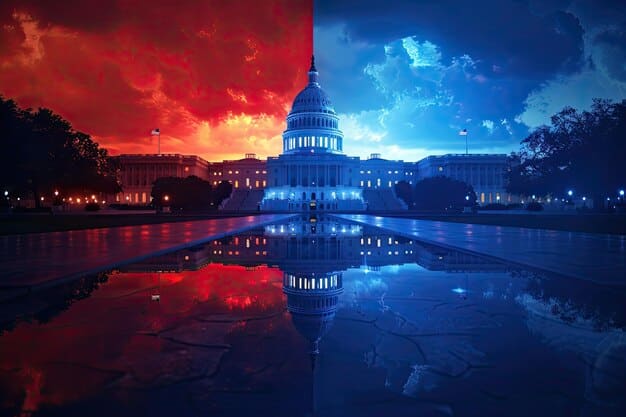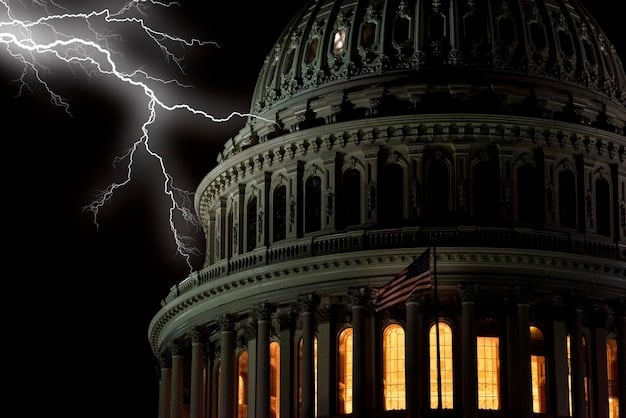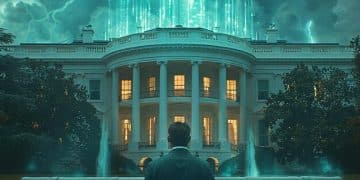US Midterm Elections: How They’ll Shape Foreign Policy in the Next 2 Years

The US midterm elections can significantly alter foreign policy decisions over the next two years by shifting the balance of power in Congress, impacting funding for international programs, trade agreements, and the ratification of treaties.
The upcoming US midterm elections are poised to potentially reshape the landscape of American foreign policy. How Will the US Midterm Elections Affect Foreign Policy Decisions in the Next 2 Years? This question looms large as voters prepare to cast their ballots and potentially shift the balance of power in Congress, leading to significant implications on everything from international trade to defense spending.
Understanding the Power Dynamics After the Midterms
The US midterm elections can trigger significant shifts in the composition of Congress. This, in turn, influences the trajectory of American foreign policy decisions, affecting both the legislative and executive branches.
Congressional Influence on Foreign Policy
Congress holds considerable power over foreign policy. It’s crucial to understand how a shift in congressional control could impact these decisions.
- Budgetary Control: Congress controls the federal purse. Changes in the majority can lead to significant shifts in funding for foreign aid, defense spending, and diplomatic initiatives.
- Treaty Ratification: The Senate must ratify treaties negotiated by the President. A hostile Senate can block or delay important international agreements.
- Legislative Oversight: Congress can conduct oversight hearings and investigations, holding the executive branch accountable for its foreign policy actions.
Historically, divided governments – where the President’s party doesn’t control both houses of Congress – often face challenges in advancing their foreign policy agenda. Increased scrutiny, funding cuts, and legislative gridlock can all become more pronounced.

Potential Shifts in Key Policy Areas
Different foreign policy areas are likely to be affected differently by the outcome of the midterm elections. Some could see significant changes, while others may remain relatively stable.
Trade Policy
Trade policy is often at the forefront of political debate. Midterm election results could steer the US in very different directions regarding trade.
A shift towards protectionist sentiment in Congress could lead to renegotiations or even withdrawal from existing trade agreements. Conversely, a more internationalist Congress might push for new trade deals and closer economic ties with other nations.
Defense Spending
Defense spending is another area highly sensitive to political shifts in Congress. Different parties often have vastly different priorities.
- Increased defense spending, especially if national security becomes a major campaign issue.
- Potential cuts to certain programs, based on partisan priorities.
- Greater congressional oversight of military operations and arms sales.
The level and focus of defense spending significantly impact the US’s ability to project power abroad and respond to international crises.
Impact on International Agreements and Alliances
The midterm elections can have a profound impact on the US’s relationships with international organizations, agreements, and alliances. Changes in congressional support can alter the course of these relationships.
Treaty Ratification and International Cooperation
A change in the Senate’s composition can either facilitate or hinder the ratification of treaties and other initiatives requiring Senate approval. This may impact how nations work together.
If the party opposing the President gains control of the Senate, the path to ratifying new treaties becomes much more difficult. Even existing agreements could come under scrutiny, with some members of Congress pushing. for withdrawal or renegotiation.
Alliances and Diplomatic Relations
Stable alliances require consistent support from both the executive and legislative branches. This is crucial to maintain these relationships.

Changes in Congress can signal a shift in US priorities, leading allies to question the long-term reliability of American commitments. Maintaining stable diplomatic relations requires demonstrating consistent support for shared values and security interests.
The Role of Public Opinion and Perception
Public opinion plays a critical role in shaping the context within which foreign policy decisions are made. Elected officials are often sensitive to the concerns and preferences of their constituents.
Public Sentiment and Policy Shifts
Changes in public sentiment regarding specific foreign policy issues can influence congressional action. Public opinion guides foreign policy direction.
If public opinion shifts towards isolationism, for example, members of Congress may be more likely to support policies that reduce US involvement in international affairs. Conversely, an increased sense of global interconnectedness can lead to greater support for international cooperation and engagement.
Media Influence and Framing
The media plays a significant role in shaping public opinion and framing foreign policy debates. This impacts what people think.
- Highlighting certain issues and downplaying others.
- Framing foreign policy decisions in ways that resonate with particular ideological perspectives.
Therefore, media narratives can influence both public sentiment and congressional decision-making.
Historical Examples and Lessons Learned
History offers several precedents for how midterm elections can impact foreign policy. By examining past events, we can gain insights into potential future outcomes.
Instances where a President faced a hostile Congress after midterm elections provide valuable lessons. In some cases, Presidents were forced to compromise on their foreign policy agenda, while in others, they found ways to work across the aisle and achieve bipartisan support.
Case Studies
Examining specific cases from the past illustrates the dynamic between midterm election results and foreign policy decisions.
Following the 2010 midterm elections, President Obama faced a Republican-controlled House of Representatives, which led to increased scrutiny of his foreign policy initiatives. This made it harder to secure funding for certain programs and to achieve bipartisan consensus on key issues.
Navigating a Divided Government
In essence, effective foreign policy requires a collaborative approach. This is even more important when the government is divided. It is crucial for stability.
Presidents can use various strategies to build consensus and achieve their foreign policy goals, even when facing a hostile Congress. These include:
- Seeking bipartisan support for key initiatives.
- Engaging in direct diplomacy with members of Congress.
- Using executive authority to implement certain policies.
The ability to navigate a divided government is essential for any President hoping to leave a lasting mark on American foreign policy.
| Key Point | Brief Description |
|---|---|
| 🗳️ Congressional Shifts | Midterms alter Congressional balance, impacting foreign policy legislation. |
| 💰 Budget Influence | Changes in funding for defense, diplomacy, and international aid programs. |
| 🤝 Treaty Approval | Senate’s role in ratifying treaties can either enable or block international deals. |
| 🌐 Public Opinion | Shifts in public sentiment influence congressional decisions on foreign policy. |
Frequently Asked Questions
▼
Midterm elections occur halfway through a president’s term and primarily focus on electing members of Congress, state, and local officials, unlike presidential elections which elect the president along with these other positions.
▼
Yes, a president can influence foreign policy even with a Congress that opposes them by utilizing executive orders, direct negotiations, and appealing to public support for specific initiatives.
▼
The Senate plays a crucial role as it must provide its advice and consent by a two-thirds vote for the ratification of any treaty negotiated by the President, determining its legal binding force.
▼
Public opinion significantly sways foreign policy as elected officials often adjust their approaches and decisions to align with prevailing public sentiment and voter preferences, directly influencing legislative action.
▼
Bipartisan support is vital for effective foreign policy, ensuring stability and continuity across administrations, strengthening the nation’s position internationally, and fostering unity in addressing global challenges.
Conclusion
In conclusion, understanding how the US midterm elections might affect foreign policy decisions in the next 2 years requires considering the intricate interplay between congressional dynamics, public sentiment, and historical context. Ultimately, the outcome of the elections has the potential to significantly steer the direction of American foreign policy.





